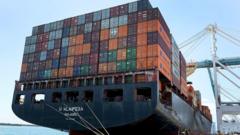The World Trade Organization (WTO) has issued a stern warning regarding the potential ramifications of tariffs imposed by US President Donald Trump, predicting a decline in global trade activity this year. The organization expressed concerns that these tariffs, combined with political uncertainty, could further exacerbate the downturn. "The decline is expected to be notably severe in North America," the WTO remarked, projecting a drop of over 10% in trade within the region.
WTO Director-General Ngozi Okonjo-Iweala pointed to the "decoupling" of the US and China as a troubling trend, which could have long-lasting impacts on global markets. Originally, the WTO anticipated a 2.7% increase in global goods trade by 2025; however, this forecast has now been adjusted to reflect a 0.2% decrease.
Chief economist Ralph Ossa highlighted the significant negative effects trade policy uncertainty can have on international trade flows, indicating that such tariffs introduce a level of unpredictability that dampens both exports and overall economic activity. Following the implementation of a baseline 10% tariff on nearly all foreign imports to the US on April 5, this concern has intensified, especially as China now faces tariffs that amount to as high as 145% on many goods.
Despite the forecasted decline in US trade, the WTO did mention that certain global regions, specifically Asia and Europe, are still expected to witness modest growth in both exports and imports. "The collective contribution to world trade growth of other regions would also remain positive," the report noted.
In an interesting development, this report marks the first time the WTO has included projections for services trade, which encompasses the exchange of services rather than goods between nations. The WTO predicts a 4% growth in services trade by 2025, though this is approximately one percentage point behind earlier estimates.
Trump's tariff policies have been a significant talking point since his inauguration, with numerous announcements aimed at boosting domestic manufacturing and reducing reliance on foreign products. However, critics argue that reviving US manufacturing is a complex endeavor that could prove challenging in the short term. Following initial tariff implementations that affected 60 of the US's trading partners, Trump issued a temporary halt on those tariffs (excluding China) in response to pushback from various stakeholders.
Warnings from financial institutions, including the Bank of England, suggest that the impacts of these tariffs may result in less disposable income for consumers in the UK as well. With the stock market reacting negatively amid trade tensions, the long-term implications of US tariff policies remain highly uncertain.
WTO Director-General Ngozi Okonjo-Iweala pointed to the "decoupling" of the US and China as a troubling trend, which could have long-lasting impacts on global markets. Originally, the WTO anticipated a 2.7% increase in global goods trade by 2025; however, this forecast has now been adjusted to reflect a 0.2% decrease.
Chief economist Ralph Ossa highlighted the significant negative effects trade policy uncertainty can have on international trade flows, indicating that such tariffs introduce a level of unpredictability that dampens both exports and overall economic activity. Following the implementation of a baseline 10% tariff on nearly all foreign imports to the US on April 5, this concern has intensified, especially as China now faces tariffs that amount to as high as 145% on many goods.
Despite the forecasted decline in US trade, the WTO did mention that certain global regions, specifically Asia and Europe, are still expected to witness modest growth in both exports and imports. "The collective contribution to world trade growth of other regions would also remain positive," the report noted.
In an interesting development, this report marks the first time the WTO has included projections for services trade, which encompasses the exchange of services rather than goods between nations. The WTO predicts a 4% growth in services trade by 2025, though this is approximately one percentage point behind earlier estimates.
Trump's tariff policies have been a significant talking point since his inauguration, with numerous announcements aimed at boosting domestic manufacturing and reducing reliance on foreign products. However, critics argue that reviving US manufacturing is a complex endeavor that could prove challenging in the short term. Following initial tariff implementations that affected 60 of the US's trading partners, Trump issued a temporary halt on those tariffs (excluding China) in response to pushback from various stakeholders.
Warnings from financial institutions, including the Bank of England, suggest that the impacts of these tariffs may result in less disposable income for consumers in the UK as well. With the stock market reacting negatively amid trade tensions, the long-term implications of US tariff policies remain highly uncertain.





















